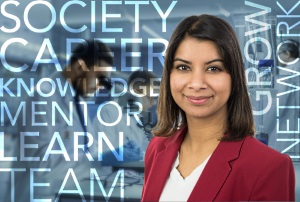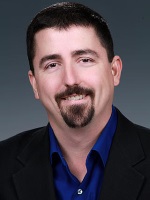Be the Catalyst of Your Career
Don't use a childish word, climb trees, or follow crowds

Sneha Akhade
In a slim book of advice, Nobel Laureate Peter Medawar eschews curiosity as the driving force for science. "Curiosity is a nursery word," he said. Building a career as a scientist is far more complicated than simple curiosity, and while it's a pretty easy bet that most scientists have the restless drive needed, passion alone won't cut it.
Chris Jones, editor-in-chief of ACS Catalysis, offered a three-step guide to catalyzing your career:
- Step 1: Start with an understanding of your personal strengths—what makes you excellent as a researcher?
- Step 2: Combine it with a knowledge of your institution's assets, both personnel and facilities—what local assets can you leverage?
- Step 3: Look at emerging areas of catalysis, where national and global experts are not yet defined.
In this article, we asked a dozen people involved with Pacific Northwest National Laboratory's Institute for Integrated Catalysis to offer their advice to those graduating this summer and entering the workforce. What did they consider important as they traveled from learning their strengths to defining an emerging area?
Starting Reagents of Your Career (Step 1)
While numerous books recommend quiet reflection or writing lists, for many people that's not the right answer. "Explore what is the best you can contribute," advises Mal-Soon Lee, who works in computational physics and catalytic chemistry at Pacific Northwest National Laboratory.
Meet other people at your institution and in the professional societies you join. "There are a lot of cliques in science," said Eric Wiedner, a PNNL chemist and member of the Center for Molecular Electrocatalysis, an Energy Frontier Research Center. "It's not meant to exclude people, but sometimes it does."
The answer is to get inside those cliques, and that's done by getting to know people. "Talk to people and look for shared interests," advised Wiedner, a self-avowed introvert. "As nice as it would be for your science to speak for itself, it doesn't always work that way."
When thinking about what makes you an excellent researcher, consider your personal style and communication skills. "It's the ability to get out of the trees and see the whole forest that really separates the good from the great," said Karis Alderson, the project manager for PNNL's Chemical Transformations Initiative. "In my opinion, the most effective scientists can clearly explain their research and describe how it supports their client's needs."
Resources, Rooflines, and Reaction Environments (Step 2)

Aaron Appel
You need to be aware of the specialized resources you can leverage for your career and how easy they are to access. "One of the great advantages is that we have many of these resources under one roof," said Aaron Appel, who manages the fundamental catalysis group at PNNL. He and his catalysis colleagues tend to work closely with one another on instruments located together in specialized laboratories at PNNL, including the Combinatorial Catalyst Lab and the Exhaust Emissions Science Laboratory.
Of course, no lab has everything you'll need. Look to the supercomputers, light sources, and other resources at the Department of Energy Office of Science's user facilities. "As an added advantage, user facilities offer you a great chance to explore and find your niche, because there is so much different work going on. You have a chance to be involved in so many different projects," said Lizabeth Alexander, who conducts trace analysis research using mass spectrometers at DOE's Environmental Molecular Sciences Laboratory.
While resources are vital, it's the people around you that often make the difference. "I'm fortunate to be surrounded by a set of people who encourage bringing all kinds of hypotheses and questions to the table, be they obvious or far-fetched," said Sneha Akhade, a postdoctoral fellow at PNNL. She is working with both theory and experiment in her work to investigate electrocatalysis at a fundamental and applied scale. "We constantly strive to challenge the envelope of capability a little more each time."
Take the time to select a good mentor. "People, more and more, are being pulled so many different directions that it really takes a special individual to stop what they are doing and mentor," said Mark Engelhard, who is a surface scientist at EMSL and has been an advocate for good mentoring at the national laboratory for years. "They'll even go into your lab and ask if you've got any questions. Having someone there and available to act in that role is critical."
Also, learn how your group works—understand the culture. "It's a warm and welcoming group that takes time to answer my questions, inform me, and support me," said Laurie Kerr, who recently joined PNNL as the administrator for the fundamental catalysis group. In such a culture, advancing can mean taking the time to collaborate on projects, review papers, offer insights, and share information.
Look for Open Space (Step 3)

Vanda Glezakou
Having the people and the resources together isn't enough. You need an emerging catalysis area that has not been defined by national and global experts. "It's simple. Don't follow the crowd," said Vanda Glezakou, a theoretical chemist who's worked on numerous catalysis studies. "Carve out your own niche."
While creating a niche takes an immense amount of work, it's more about quality than quantity. "Don't do a lot of work," advises Roger Rousseau, who leads PNNL's molecular theorists. "Be thorough and creative—that will make you stand out."

Roger Rousseau
With the area in mind, understand the sponsoring agencies. "It's vital to understand where you can get funding," said Karl Mueller, a Chief Science and Technology Officer at PNNL. "Once you know where, you need to understand what drives your potential sponsors."
"If you find the right topic and combine it with steps 1 and 2, you have set yourself up for success as a globally visible researcher who has brought impact to her or his field," said Jones of his three-step process.
And that's our advice to those who want to catalyze their careers. Do you have a piece of advice you'd like to share? Send it along to Kristin Manke. We'll add our favorites to a follow-up article later this spring.
About the author: Kristin Manke is a science writer and technical communicator at Pacific Northwest National Laboratory with more than 20 years of experience in writing about chemistry and the people involved in it.

